Related Research Articles
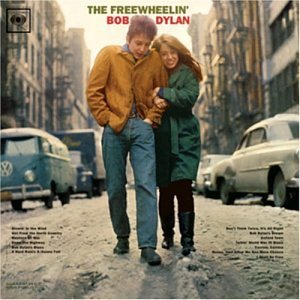
The Freewheelin' Bob Dylan is the second studio album by the American singer-songwriter Bob Dylan, released on May 27, 1963, by Columbia Records. Whereas his self-titled debut album Bob Dylan had contained only two original songs, this album represented the beginning of Dylan's writing contemporary lyrics to traditional melodies. Eleven of the thirteen songs on the album are Dylan's original compositions. It opens with "Blowin' in the Wind", which became an anthem of the 1960s, and an international hit for folk trio Peter, Paul and Mary soon after the release of the album. The album featured several other songs which came to be regarded as among Dylan's best compositions and classics of the 1960s folk scene: "Girl from the North Country", "Masters of War", "A Hard Rain's a-Gonna Fall" and "Don't Think Twice, It's All Right".
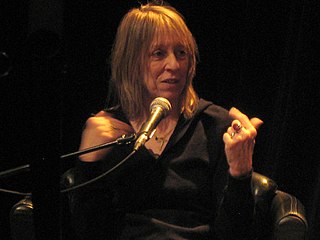
Susan Elizabeth Rotolo, known as Suze Rotolo, was an American artist, widely known as Bob Dylan's girlfriend from 1961 to 1964. Dylan later acknowledged her strong influence on his music and art during that period. Rotolo is the woman walking with him on the cover of his 1963 album The Freewheelin' Bob Dylan, a photograph by the Columbia Records studio photographer Don Hunstein. In her book A Freewheelin' Time: A Memoir of Greenwich Village in the Sixties, Rotolo described her time with Dylan and other figures in the folk music and bohemian scene in Greenwich Village, New York. She discussed her upbringing as a "red diaper" baby; a child of Communist Party USA members during the McCarthy Era. As an artist, she specialized in artists' books and taught at the Parsons School of Design in New York City.
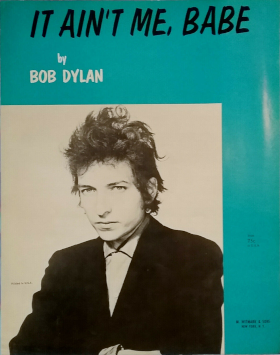
"It Ain't Me Babe" is a song by Bob Dylan that originally appeared on his fourth album Another Side of Bob Dylan, which was released in 1964 by Columbia Records. According to music critic Oliver Trager, this song, along with others on the album, marked a departure for Dylan as he began to explore the possibilities of language and deeper levels of the human experience. Within a year of its release, the song was picked up as a single by folk rock act the Turtles and country artist Johnny Cash. Jan & Dean also covered the track on their Folk 'n Roll LP in 1965.
"Absolutely Sweet Marie" is a song by American singer-songwriter Bob Dylan, which was released on the third side of the double album and Dylan's seventh studio album, Blonde on Blonde (1966). The song was written by Dylan and produced by Bob Johnston. It was recorded at around 1:00 am on March 8, 1966, at Columbia Studio A, Nashville. Some commentators have interpreted the song as being about sexual frustration.
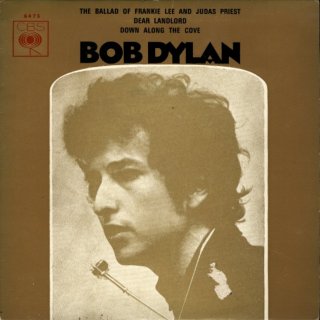
"The Ballad of Frankie Lee and Judas Priest" is a song by American singer-songwriter Bob Dylan. It was released as the fifth track on his eighth studio album John Wesley Harding (1967). The track was written by Dylan and produced by Bob Johnston. It was recorded in one take on October 17, 1967, at Columbia Studio A in Nashville. The song's lyrics refer to two friends, Frankie Lee and Judas Priest. Lee asks Priest for a loan of money and Priest offers it freely. Lee spends it in a brothel over 16 days, then dies of thirst in Priest's arms. It has been suggested by commentators that the song refers to Dylan's relationship with his manager Albert Grossman or to his contractual negotiations with his record company. The song received a mixed critical reception. Dylan performed the song live in concert 20 times, from 1987 to 2000.
"Masters of War" is a song by Bob Dylan, written over the winter of 1962–63 and released on the album The Freewheelin' Bob Dylan in the spring of 1963. The song's melody was adapted from the traditional "Nottamun Town." Dylan's lyrics are a protest against the Cold War nuclear arms build-up of the early 1960s.
"Tombstone Blues" is a song by American singer-songwriter Bob Dylan, which was released as the second track on his sixth studio album Highway 61 Revisited (1965). The song was written by Dylan, and produced by Bob Johnston. Critical interpretations of the song have suggested that the song references the Vietnam War and US President Lyndon Baines Johnson.
"Bob Dylan's Dream" is a song written by Bob Dylan in 1963. It was recorded by Dylan on April 24, 1963, and was released by Columbia Records a month later on the album The Freewheelin' Bob Dylan.
"Talkin' New York" is the second song on Bob Dylan's eponymous first album, released in 1962. A talking blues, the song describes his feelings on arriving in New York City from Minnesota, his time playing coffee houses in Greenwich Village, and his life as a folksinger without a record deal. The lyrics express the apparent difficulty he had finding gigs as a result of his unique sound, with a character in the song telling Dylan: "You sound like a hillbilly; We want folk singers here."
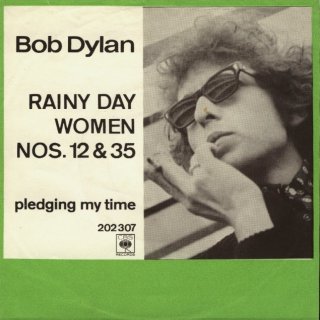
"Pledging My Time" is a blues song by the American singer-songwriter Bob Dylan from his seventh studio album, Blonde on Blonde (1966). The song, written by Dylan and produced by Bob Johnston, was recorded on March 8, 1966 in Nashville, Tennessee. Dylan is featured on lead vocals, harmonica, and guitar, backed by guitarist Robbie Robertson and an ensemble of veteran Nashville session men.
"Girl from the North Country" is a song written by Bob Dylan. It was recorded at Columbia Recording Studios in New York City in April 1963, and released the following month as the second track on Dylan's second studio album, The Freewheelin' Bob Dylan. Dylan re-recorded the song as a duet with Johnny Cash in February 1969. That recording became the opening track on Nashville Skyline, Dylan's ninth studio album.
"To Ramona" is a song by American singer-songwriter Bob Dylan, first released on his fourth studio album, Another Side of Bob Dylan (1964). The song was written by Dylan, and produced by Tom Wilson. The lyrics were started at the May Fair Hotel in London in May 1964, and finished during a week-long stay in the Greek village of Vernilya later that month. Dylan recorded all the tracks for the album, including the song, in a single three-hour session on June 9, 1964, at Studio A, Columbia Recording Studios, New York. Its narrator advises Ramona, who is preparing to return to "the South", not to follow the advice of others. Critics have suggested several different people as inspirations for the song, including Joan Baez, Suze Rotolo, and Sara Lownds.

The Original Mono Recordings is a box set compilation album of recordings by Bob Dylan, released in October 2010 on Legacy Recordings, catalogue 88697761042. It consists of Dylan's first eight studio albums in mono on nine compact discs, the album Blonde on Blonde being issued on two discs as in its original vinyl format. It does not include the singles collection Bob Dylan's Greatest Hits released during the same time span. The set includes a 56-page booklet with photographs, discographical information, and an essay by Greil Marcus. It peaked at No. 152 on the Billboard 200.

The Bootleg Series Vol. 9: The Witmark Demos: 1962–1964 is a compilation album by American singer-songwriter Bob Dylan, containing demo recordings he made for his first two publishing companies, Leeds Music and M. Witmark & Sons, from 1962 to 1964. The seventh installment of the ongoing Bob Dylan Bootleg Series, it was released on October 19, 2010 on Legacy Records.
"Mama, You Been on My Mind" is a song by American singer-songwriter Bob Dylan. Written in 1964 during a trip to Europe, the song dealt with his recent breakup with his girlfriend, Suze Rotolo. Dylan first recorded the song in June of that year during a session for his album Another Side of Bob Dylan. However, the song was not included on the album, and Dylan's version remained unreleased until 1991. In total, in the 1990s and 2000s four versions were put out on Dylan's Bootleg Series of releases, including two live performances with Joan Baez from 1964 and 1975.
"Talkin' Bear Mountain Picnic Massacre Blues" is a song by American singer-songwriter Bob Dylan. It was written by Dylan in June 1961, and recorded on April 25, 1962, at Studio A, Columbia Recording Studios, New York, produced by John Hammond. It is a humorous talking blues, which Dylan wrote after Noel Stookey gave him a press clipping about how the sale of forged tickets for a Father's Day picnic trip to Bear Mountain State Park had led to overcrowding and injuries.
"I Shall Be Free" is a song by American singer-songwriter Bob Dylan. It was recorded on 6 December 1962 at Studio A, Columbia Recording Studios, New York, produced by John Hammond. The song was released as the closing track on The Freewheelin' Bob Dylan on 27 May 1963, and has been viewed as a comedic counterpoint to the album's more serious material. Dylan has never performed the song in concert.
"Highway 51 Blues" was the title of a song composed by American blues pianist Curtis Jones, released on a 78 record on January 12, 1938, which was popular enough to spawn several covers and offshoots, including "New Highway 51," recorded in 1940 by the Mississippi guitarist and singer Tommy McClennan. Bob Dylan's track "Highway 51", released as the closing track of the first side of his debut album Bob Dylan on March 19, 1962, was based on McLennan's recording.
"I Shall Be Free No. 10" is a song by American singer-songwriter Bob Dylan, which was released as the fifth track on his fourth studio album Another Side of Bob Dylan (1964). The song was written by Dylan and produced by Tom Wilson. The song is a humorous talking blues, indebted to earlier songs including Lead Belly's "We Shall Be Free". Dylan opens the song by proclaiming that he is normal and average, but then acknowledges his reputation by singing the self-aware doggerel "Yippee! I'm a poet, and I know it/ Hope I don't blow it".
"Suze (The Cough Song)" is a song by American singer-songwriter Bob Dylan, recorded in 1963 during the sessions for his third studio album, The Times They Are a-Changin' (1964). The song was written and performed by Dylan, and produced by Tom Wilson. It was released on The Bootleg Series Volumes 1–3 (Rare & Unreleased) 1961–1991 (1991).
References
- 1 2 3 4 5 6 Margotin, Philippe; Guesdon, Jean-Michel (2015). Bob Dylan All the Songs: The Story Behind Every Track. Black Dog and Leventhal Publishers. p. 59. ISBN 978-1579129859.
- 1 2 3 4 "Down the Highway". bobdylan.com. Retrieved May 24, 2021.
- 1 2 Trager, Oliver (2004). Keys to the rain: the definitive Bob Dylan encyclopedia. New York: Billboard Books. p. 163. ISBN 0823079740.
- 1 2 "Still on the road: 1962 concerts and recording sessions". bjorner.com. Olof Björner. Archived from the original on November 20, 2010. Retrieved May 14, 2021.
- ↑ Williams, Paul (2004). Bob Dylan: performing artist. 1960–1973 the early years. Omnibus Press. p. 55. ISBN 1844490955.
- ↑ Ober, Chick (May 11, 1964). "Vikki's voice in full bloom". Tampa Bay Times. St. Petersburg, Florida. p. 48.
- ↑ Hentoff, Nat (1963). The Freewheelin' Bob Dylan (Media notes). Bob Dylan. New York: Columbia Records.
- ↑ Heylin, Clinton (1995). Revolution in the Air – the songs of Bob Dylan Vol.1 1957–73. Constable & Robinson. pp. 103–105. ISBN 9781849012966.
- ↑ Sounes, Howard (2011). Down the highway: the life of Bob Dylan. London: Doubleday. pp. 386–387. ISBN 9780802145529.